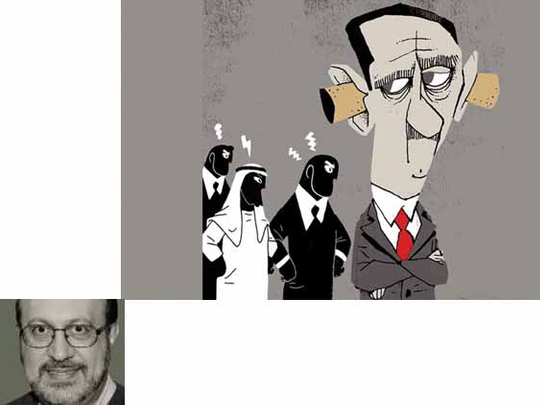
The affable Secretary-General of the Organisation of Islamic Cooperation (OIC), Ekmeleddin Ihsanoglu, was crystal clear: “Everyone in Syria should know that the scorched earth policy has never been a guarantee for stability or a safety valve... It is rather a crack in the body of the nation and a deep wound which would take a long time to heal.”
Damascus entered a dark and endless tunnel, he added, the “direct result of ignoring the legitimate demands and aspirations of the people.”
As expected, this declaration came as a prelude to a dramatic decision reached by the 57-member OIC, to suspend Syria from the association.
Inasmuch as the judgment was a clear expression of the pan-Islamic body’s revulsion at the violence that the Al Assad regime practiced against civilians, OIC leaders engaged in what was a minimalist option.
Simply stated, few anticipated an end of the civil war, which has now gripped Syria for nearly two years. Even fewer contemplated an effective ceasefire anytime soon. Nearly every OIC official at the Makkah Islamic Solidarity conference understood that the next summit would continue to be preoccupied by Syria.
In fact, because the OIC decision to suspend Syria was not unanimous, it was difficult to anticipate a positive outcome. According to a high-ranking Saudi official, the preparatory OIC foreign ministers’ meeting that convened in Jeddah and that reached the decision to suspend Syria, lasted nearly 12 hours.
While it included Iranian representatives, Syrian officials were not invited, which prompted the permanent Iranian OIC envoy to raise various objections.
“The Syrians are still part of the OIC, and they therefore should have been invited to the preparatory meeting,” one of the Iranian diplomats insisted.
Arab diplomats, on the other hand, opined that Iran “refused to see the writing on the wall and continue to support a regime that has lost the moral ground to continue in power.”
Iran, represented at Makkah by President Mahmoud Ahmadinejad, stood by President Bashar Al Assad and saw foreign conspiracies to topple its Damascene ally.
It rejected the nascent Saudi-Qatari-Turkish coalition that aimed to arm the Free Syrian Army (FSA) that, from Tehran’s perspective, was akin to an American-French-British cabal against a fellow Muslim state.
That was precisely what Ahmadinejad argued to the assembly though neither King Abdullah Bin Abdul Aziz nor Shaikh Hamad Bin Khalifah Al Thani accepted his logic.
Both insisted that the revolution was a genuine home-grown rejection of an illegitimate rule.
For his part, President Abdullah Gul reminded his Iranian counterpart that Ankara worked hard to find a political solution, emphasising the amount of time granted Al Assad to persuade him to change his ways. Gul apparently scolded Ahmadinejad, calling on his Iranian counterpart to distance Tehran from a condemned government, for the benefit of the entire Muslim World.
Gul further insisted that Turkey’s backing of the FSA received overwhelming international support.
In the event, Ahmadinejad’s pleas to encourage a political dialogue between Al Assad and opposition forces fell on deaf ears, while several Arab leaders contemplated what would their next steps be.
For it was critical to note that this suspension from the OIC came after the 22-member League of Arab States expelled Syria last November, a decision that meant little to the Damascene save for theatrical pronouncements by his foreign minister, Walid Al Mualim.
At the time, leaders gathered in Cairo assumed that Al Assad would not accept to be isolated and, presumably, would alter his violent practices.
In Makkah, OIC leaders repeated the same mistake, pretending that Al Assad could not possibly accept to be cut off from the rest of the Muslim world.
Al Assad, it was worth remembering, famously levelled insults to leaders of Arab Gulf countries, including the Saudi ruler, as being nothing more than “half-men” in the aftermath of the 2006 Israeli-Hezbollah war.
Real men forgave the unproven Syrian at the March 2009 Arab League Doha Summit, as well as the July 2010 follow-up initiative when Abdullah flew Al Assad on his plane from Damascus to Beirut, to help seal Lebanese unity.
It was King Abdullah that literally brought Al Assad back from the global diplomatic abyss that engulfed the Syrian then.
No one now expects the patient Saudi monarch to embark on a similar adventure, viscerally distraught by daily reports that illustrate on television networks and, more important, on YouTube, the killings and wholesale destruction of the entire country.
Al Assad was adamant and literally turned down various Saudi and Qatari mediation efforts to stop the bloodshed and initiate genuine reconciliation.
Saudi emissaries recently returned from Damascus livid by Al Assad’s preferred methods, concluding that the Baath leader intended to regain full powers, even if that meant the death of nearly a million Syrians.
OIC leaders who now suspended Syria’s membership will have two choices that confronted their governments: watch the Baath regime wither at the proverbial vine or help accelerate its inevitable destruction.
King Abdullah, along with other regional and international leaders, seem determined to invest in a post-Al Assad or even a post-Baath Syria, standing with ordinary people and against a spent regime whose foreign allies, especially Russia, China and Iran, place their own strategic interests above Syrian lives.










